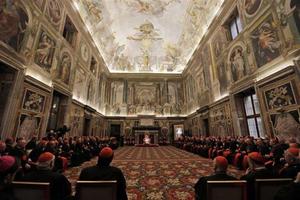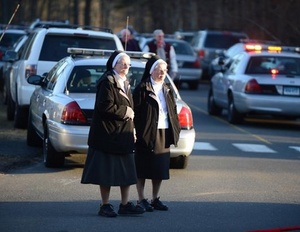Locking school doors will not keep Satan out if our hearts are open to him. Nor will banning weapons ban murder if God is banned from the conscience. Cain slew Abel without a gun. An illogical world can be saved from self-destruction only by loving the Logos who was in the Beginning, who was with God and was God.
Faith & the Public Order: December 2012 Archives

Pope Benedict gave his annual address, a "State of the Church," if you will, to the curial officials of the Holy See today.
You might say the content talk is crucially relevant for the work of the Church and the proclamation of the Gospel as he reviews key events and focuses on some themes. Among many things which need our attention and reflection, the Pope spoke about nature of man, family life, and inter-religious dialogue. Regarding man in which he gave insight into, he speaks of how evil and destructive vague and ideological the "gender conscious crowd" is to the nature of the person and removes God from conversation. Read the full text here.
The Pope notes the crisis of the family and its effect on society, caused by the unwillingness to make a commitment and by unwillingness to suffer. But he goes beyond the symptoms to diagnose the cause of the crisis. This talk is not an attack, it is an appeal to truth.
Each of Pope Benedict's addresses to the Roman Curia are important, certainly the 2005 address stands out, but today's will be memorable.
Here's a section:
First of all there is the question of the human capacity to make a commitment or to avoid commitment. Can one bind oneself for a lifetime? Does this correspond to man's nature? Does it not contradict his freedom and the scope of his self-realization? Does man become himself by living for himself alone and only entering into relationships with others when he can break them off again at any time? Is lifelong commitment antithetical to freedom? Is commitment also worth suffering for? Man's refusal to make any commitment - which is becoming increasingly widespread as a result of a false understanding of freedom and self-realization as well as the desire to escape suffering - means that man remains closed in on himself and keeps his 'I' ultimately for himself, without really rising above it. Yet only in self-giving does man find himself, and only by opening himself to the other, to others, to children, to the family, only by letting himself be changed through suffering, does he discover the breadth of his humanity. When such commitment is repudiated, the key figures of human existence likewise vanish: father, mother, child - essential elements of the experience of being human are lost".
 In the days following the Newtown tragedy many people are applying the concept of hero to those who lived and died with dignity offering themselves for the good of others. The adults at the Sandy Hook School can certainly be labeled as a heros. We can also bestow the title of hero on those who responded: police and fire personnel, healthcare professionals and social workers, and members of the clergy and consecrated religious.
In the days following the Newtown tragedy many people are applying the concept of hero to those who lived and died with dignity offering themselves for the good of others. The adults at the Sandy Hook School can certainly be labeled as a heros. We can also bestow the title of hero on those who responded: police and fire personnel, healthcare professionals and social workers, and members of the clergy and consecrated religious. 



